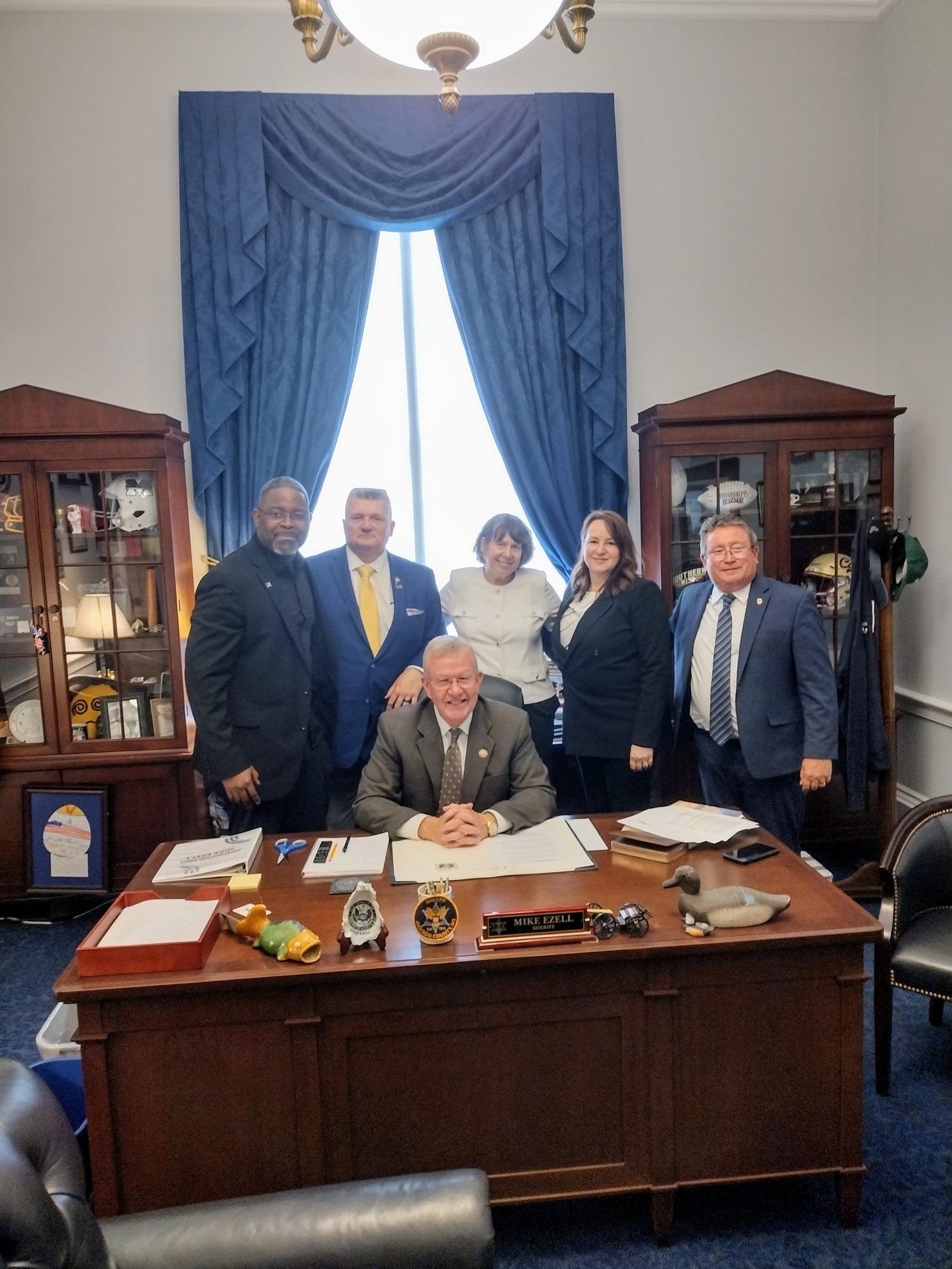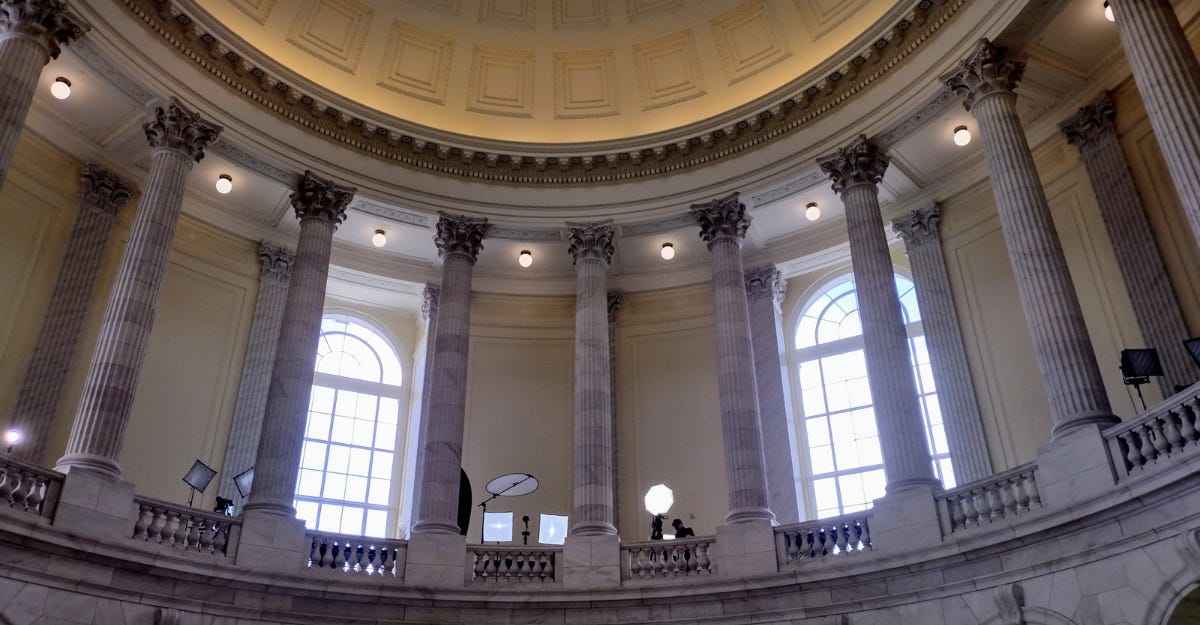Lobbying Really Works; Two Bills That Passed the House Last Week; Organized Retail Crime Syndicates
And the enemy within
This past Tuesday I woke up to news that Rep. Mike Ezell of Mississippi had signed on as the newest co-sponsor to the Qualified Immunity Act of 2025. This critical bill (H.R. 503 / S. 122) would codify qualified immunity protections (already recognized and upheld by the Supreme Court since 1967) into law.
Qualified immunity doesn’t mean officers get a free pass when they violate the law or someone’s constitutional rights. In these cases, they would be held accountable in a court of law.
This bill simply ensures that they can perform their work in good faith, without fear of financial ruin via frivolous lawsuits.
Why is Rep. Ezell’s support such a big deal?
Rep. Ezell’s signature is especially significant because our group met with him and other federal lawmakers last week in D.C. to discuss critical law enforcement bills. One of the issues we prioritized was qualified immunity.

Qualified immunity isn’t the easiest topic to try to sell. It’s controversial, perhaps in part because it’s so poorly misunderstood.
Yet we managed to make our case.
Rep. Ezell wasn’t the only lawmaker who helped advance law enforcement legislation during National Police Week. New co-sponsors were recently added to other important bills, including the Protect and Serve Act of 2025 (S. 167 / H.R. 1551), which gained five new signatures in the Senate and six in the House.
Keep in mind that legislators who haven’t co-sponsored a bill may still end up voting in favor of it.
At least some of these new signatures are a result of our meetings with lawmakers, as well as your phone calls and emails. So thank you for that! This shows me that approaching legislators respectfully, facts in hand, translates to positive outcomes.
There will be times when even our best efforts may turn out to be futile. The alternative, however, is to do nothing. For me, and for our dedicated team members, that’s a non-starter.
Federal Bills That Passed the House Last Week
LEOSA Reform Act (H.R. 2243)
This bill, which amends the Law Enforcement Officers Safety Act (LEOSA), expands the ability of current and retired officers to carry concealed firearms in certain public places. It has crossed over to the Senate.
You can see how your House member voted on this bill here.
Improving Law Enforcement Officer Safety and Wellness Through Data Act (H.R. 2240)
It expands how the Federal government reports attacks on officers. Though the federal government already collects basic information on these attacks via the Law Enforcement Officers Killed and Assaulted (LEOKA) database, we need a wider breadth of data to understand the factors contributing to the rise in violence being perpetrated on police officers.
Current LEOKA data points include whether an officer was killed accidentally or unlawfully; which type of weapon the suspect used; and whether the officer was injured.
This bill would expand these data points to include things like whether offenders are targeting law enforcement because of anti-police sentiments; and how well agencies are preparing their officers to respond to these attacks.
Having this information would place lawmakers and police departments in a better position to protect officers and develop preventative solutions.
You can see how your House member voted on this bill here.
Organized Retail Crime Syndicates
I wanted to tell you about the Combating Organized Retail Crime Act (S. 1404 / H.R. 2853) sooner, but most of my bandwidth was being used for our Police Week lobby event.
Organized retail networks are large-scale, sophisticated multinational crime syndicates whose “employees” steal large amounts of merchandise from retail stores, warehouses, and truckers, then funnel their “profits” into human trafficking and terrorist activities.
These syndicates are not just a threat to public safety. They perpetuate fraud, cause legitimate businesses to close, and have a negative effect on communities, especially those dependent on essential items and jobs these stores provide.
It’s a crime category that’s been allowed to grow in recent years, largely because not all district attorneys are prosecuting “lesser crimes” involving theft.
You can read more about this bill and the impetus for it, here.
The Enemy Within
I agree with pundits like Scott Jennings, who warn that heinous acts like what occurred in D.C. this past week are evidence of a burgeoning cultural war.
“After the execution of two Israeli diplomats on our soil, let me be clear: The fight for the future of Western Civilization and our culture is happening NOW.” —Scott Jennings
When moral relativism replaces the basic tenets of right and wrong, the government becomes a substitute for the nuclear family unit, and ideological beliefs gleaned from so-called “scholars” supersede faith, chaos is bound to eventually materialize.
While much of my advocacy time is spent on shepherding critical police bills, I keep in front of me that our nation’s current malaise transcends laws and legislation.
As Bari Weiss writes,
“But no police force, not even the best in the world, can hold back a culture that has embraced violence as a means of expression, that has lost hold of the difference between life and death.” —Bari Weiss
The type of crimes that have manifested in recent years come from what can only be described as a deep-seated, misguided hatred of others. They’re the culmination of a mental health crisis and spiritual decay that has been allowed to fester for decades, coupled with poor past foreign policy decisions that have strengthened our enemies.
While we can hold people accountable for their criminal acts, we can’t legislate morality. We also can’t expect the police to single-handedly conquer crime, especially during a national staffing shortage. Cops can’t be everywhere, and rage-filled people intent on doing harm will sadly find a way.
That said, law enforcement is the only entity standing between us and anarchy. Our way of life still remains dependent on police officers who are willing to protect the most vulnerable among us, solve crimes, arrest violent offenders, aid victims, manage unruly crowds, defend our civil liberties, and uphold the Constitution.
Through legislation, we can indeed strengthen law enforcement, so that officers are in an optimal position to protect us. We will always need cops, but especially so during times when uncertainty, insanity, and plain adulterated evil have gripped our nation.
Trying to solve all that ails our country is overwhelming and will likely not be remedied any time in the near future. Working to get critical bills passed is however, quite doable and very well within our immediate reach.
I hope you’re on board.
For the Blue is a solutions-based initiative. I’m just an American patriot asking questions. I don’t work with any political party and I answer to nobody. For me, the health of the nation, due process (including for police officers), the rule of law, and respect for individual liberties, will always transcend party affiliation. I welcome your thoughts, even if you disagree; though personal attacks will be ignored. You can reach me at fortheblue@substack.com.










I'm in! Congressman Ezell was very specific with our group asking why does this need to happen at the Federal level. Fair question and glad we were able to give him something to think about.
Paula:
Your tireless efforts are paying off. Thank you for championing this vital project. And Scott Jennings, a national treasure in my book!
Best regards,
Roger Volbrecht